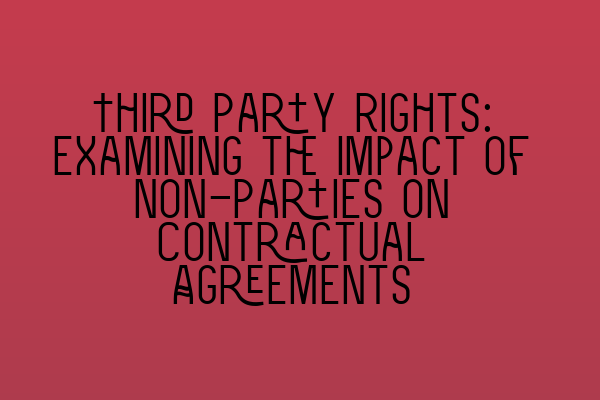Third Party Rights: Examining the Impact of Non-Parties on Contractual Agreements
Welcome to the SQE Contract Law blog! In today’s post, we will be exploring the fascinating area of third party rights and how they can impact contractual agreements. Whether you are a solicitor, law student, or simply have an interest in contract law, this article will provide valuable insights and analysis. So, let’s dive right in!
Firstly, let’s define what we mean by third party rights in contract law. In a typical contractual agreement, there are two parties involved – the promisor and the promisee. The promisor is the party making the promise, while the promisee is the party who receives the promise. However, there are situations where a non-party, someone not directly involved in the contract, may have certain rights under the agreement.
One common example of third party rights is when a contract includes a provision allowing the promisee to assign their rights to a third party. This means that the promisee can transfer their rights, such as the right to receive payment, to someone else. In such cases, the third party becomes a party to the contract, with their own set of rights and obligations.
Now, you may be wondering, why would a party want to assign their rights to a third party? Well, there are several reasons for this. For instance, the promisee may want to delegate the performance of certain obligations under the contract to a third party. This can be particularly useful when the promisee does not have the resources or expertise to fulfill those obligations themselves.
Additionally, assigning rights to a third party can be a way for the promisee to enforce the contract more effectively. If the promisor fails to fulfill their obligations, the promisee can transfer their rights to a third party who is better equipped to take legal action. This can provide an added layer of protection and ensure that the promisee’s rights are upheld.
However, it’s important to note that not all contracts allow for the assignment of rights to third parties. In fact, many contracts expressly prohibit such assignments. Therefore, it is crucial to carefully review the terms of the contract to determine whether third party rights are permitted. A skilled solicitor can assist in analyzing the contract and advising on the best course of action.
In some cases, even if the contract does not permit the assignment of rights, a third party may still acquire certain rights through what is known as the doctrine of privity of contract. The doctrine of privity generally states that only parties who are privy to the contract have rights and obligations under it. However, there are exceptions to this rule, and in certain circumstances, a third party may be able to enforce the terms of a contract.
One such exception is when the contract includes a provision that expressly confers a benefit on a third party. This is known as a third party beneficiary. For example, if A and B enter into a contract in which A promises to pay B £1,000, but B owes C £500, and C is named in the contract as a beneficiary of A’s payment, then C would have a right to enforce the contract and receive the £500 owed to them.
It’s worth mentioning that the rights of a third party beneficiary can be subject to certain limitations. For instance, if the contract includes a clause stating that the promisee can revoke the third party’s rights at any time, then the promisee may have the ability to prevent the third party from enforcing the contract.
So, what should parties be mindful of when it comes to third party rights? Firstly, it is essential to clearly define the scope and extent of third party rights in the contract. This includes identifying who the third party is, what rights they have, and any limitations on those rights. Failing to do so can lead to confusion and potential disputes down the line.
Furthermore, parties should carefully consider whether they want to include provisions allowing for the assignment of rights to third parties. This can provide flexibility and additional options for enforcing the contract, but it also carries risks. A solicitor can provide expert guidance on the potential pros and cons of including such provisions and can help draft the necessary language to protect the party’s interests.
In conclusion, third party rights can have a significant impact on contractual agreements. Whether it’s through the assignment of rights or the doctrine of privity, non-parties can acquire rights and enforce obligations under a contract. Parties must carefully consider the implications of third party rights and seek legal advice to ensure their rights are adequately protected.
We hope you found this blog post informative and insightful. If you’re interested in delving further into the world of contract law, be sure to check out our related articles:
- Securing Training Contracts: A Roadmap to Becoming a Solicitor
- Mentorship for Aspiring Solicitors: Nurturing Talent in the Legal Field
- Legal Challenges and Pitfalls: Navigating the Complexities of the Legal System
- The GDL (Graduate Diploma in Law): A Pathway to Becoming a Solicitor
- Mastering the Solicitor’s Path: Prepare for the Journey Ahead
If you have any questions or would like to discuss your specific contract law needs, please don’t hesitate to contact us. Our team of experienced solicitors are here to assist you.
